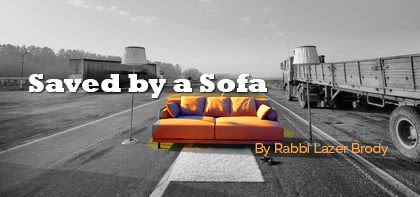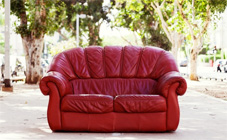
Saved by a Sofa
Nachum's neighbor opened up a furniture store on the ground floor of their apartment building, blocking the entrance and inconveniencing everyone...

If you think that New Delhi, Shanghai or Cairo are the most densely populated cities on earth, you haven’t yet seen Bnai Brak. Like they say in Yiddish, kein ein hora – may there be no evil eye! A typical Bnai Brak apartment building has four stories with four flats on each story, plus another four flats on the ground floor, for a total of twenty flats per building on the average. If your neighbor in the next building wants to borrow a potato from you, you can hand it to her from your kitchen window, for if she reaches out of her kitchen window, your outstretched arm will meet hers. What’s more, each family has about ten children, may Hashem bless them, so that each 20-flat will have a population of around 200+ people. Now, consider that the front yard/entrance is only about 300 square feet. Got the picture?
Nachum, a kosher supervisor in a local food factory, was really perturbed. His neighbor Chaimke on the ground floor was a nice guy with eleven children who studied Torah all day long and never had enough money to make ends meet. To make things worse, the Chaimke’s oldest daughter just turned 17 and would be reaching “shidduch age” in another year; if he didn’t start bringing in some more money soon, then marrying her off would be a problem. Chaimke decided to open his own business at home. He’d still learn Torah all day long, but he’d sell furniture at night.
 In Israel, the skies are blue from April through October. Chaimke therefore wasn’t worried about rain. He therefore made the entrance to their building into an outdoor furniture showroom that spilled over onto the sidewalk. Nachum loved order and beauty. The view from his front balcony was ruined, because of all the furniture clutter, and coming into the entrance to the was like running a military obstacle course. None of the other neighbors said a word, but Nachum’s patience was running out.
In Israel, the skies are blue from April through October. Chaimke therefore wasn’t worried about rain. He therefore made the entrance to their building into an outdoor furniture showroom that spilled over onto the sidewalk. Nachum loved order and beauty. The view from his front balcony was ruined, because of all the furniture clutter, and coming into the entrance to the was like running a military obstacle course. None of the other neighbors said a word, but Nachum’s patience was running out.
Several times, Nachum thought about approaching Chaimke on the subject. But then he thought, how can he ruin the efforts of a Torah scholar with eleven children to make a living? Nachum knew how hard it was to make a living for his family, with a wife and eight children. But nevertheless, this was a flagrant violation of common property rights, explicit in the Gemara and in Shulchan Aruch. Unsure of what to do, he decided to consult the local posek, the rabbinical authority of the neighborhood.
The rabbi listened to Nachum’s explanation. On his way to synagogue, the rabbi had even seen the entrance to Nachum’s building, so he knew that Nachum wasn’t exaggerating. According to Jewish Law, Nachum and the other residents of the building had every right to force Chaimke to remove the furniture from the common domain, the front yard and the entrance to the building. The rabbi also knew Chaimke and his predicament.
The rabbi closed his eyes in deep thought. Four parallel wrinkles became prominent on his forehead. He prayed for Divine guidance, opened his eyes and said, “Reb Nachum, you and your neighbors are entitled to require Chaimke to vacate the furniture and any other encroachment of the building’s mutual domain. I realize that it’s both troublesome and irritating. That’s the law. Yet, there’s the element of mercy that goes beyond the realm of the dry law. Here, we have a poor Torah scholar trying to make a living. He most certainly can’t afford to rent a store. I’m not telling you what to do, but I’m merely suggesting, if you willingly accept this inconvenience, the Almighty will undoubtedly bless you, and save you much worse problems and inconveniences. The Almighty has extra compassion for those who have compassion on others.”
Nachum knew that the rabbi was right. He thanked him and left, committing in his heart to joyfully accept and adopt the rabbi’s advice. So what if the view from his balcony wasn’t so nice? He imagined that Chaimke’s predicament was his own, so he felt so much more sympathy and compassion for him.
Nachum and the other neighbors became accustomed to the fact that the entrance to their building was a furniture store. A few weeks later, no one gave it a second thought.
No one knew how Nachum’s three year-old son managed to climb the four-foot high iron railing on the front balcony. Nachum’s wife glanced at the balcony, which was off the living room of their 4th-story flat, and screamed. The neighbors thought there was a terrorist attack. The little boy was startled, lost his balance, and free-fell like a skydiver from the fourth floor, over thirty five feet in the air.
The little boy landed right on Chaimke’s cushiest, thickest padded sofa in the front yard. He came out without a scratch.
* * *
The above story has been circulating in Israel recently; I don’t personally know if it’s true or not, but that’s irrelevant. Hashem can certainly do such things whenever He wants to…
You never lose by giving into someone, even when you’re right. Hashem sees everything – nothing is forgotten. In measure-for-measure, Hashem saw Nachum’s compassion for Chaimke’s children. Hashem therefore displayed miraculous compassion for Nachum’s children. As the rabbi said, when we willingly accept a small inconvenience with emuna, knowing that it comes from Hashem, the Almighty will undoubtedly save us from much worse problems and inconveniences, even from the loss of life, Heaven forbid. The Almighty has extra compassion for those who have compassion on others. Let’s never forget that!










Tell us what you think!
Thank you for your comment!
It will be published after approval by the Editor.